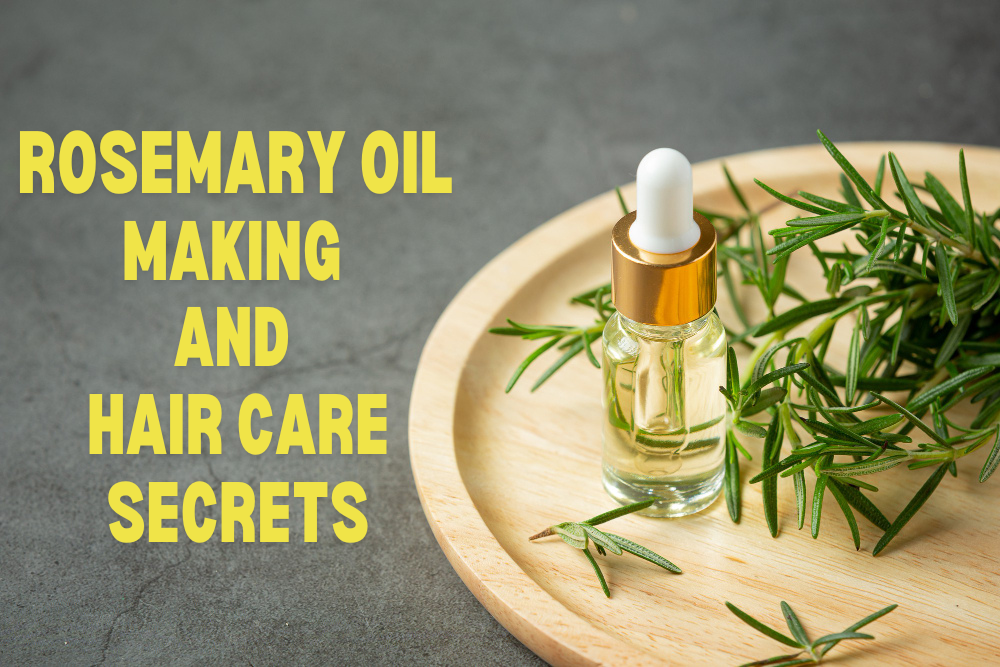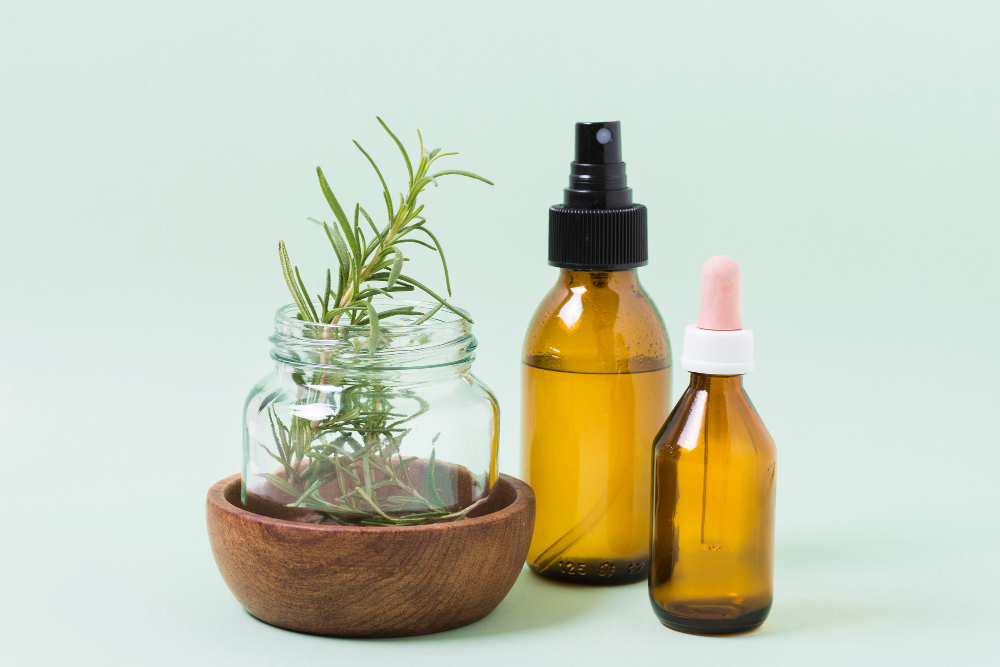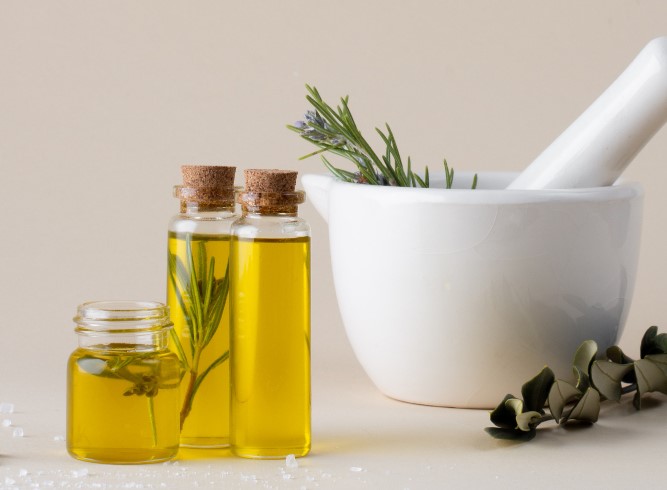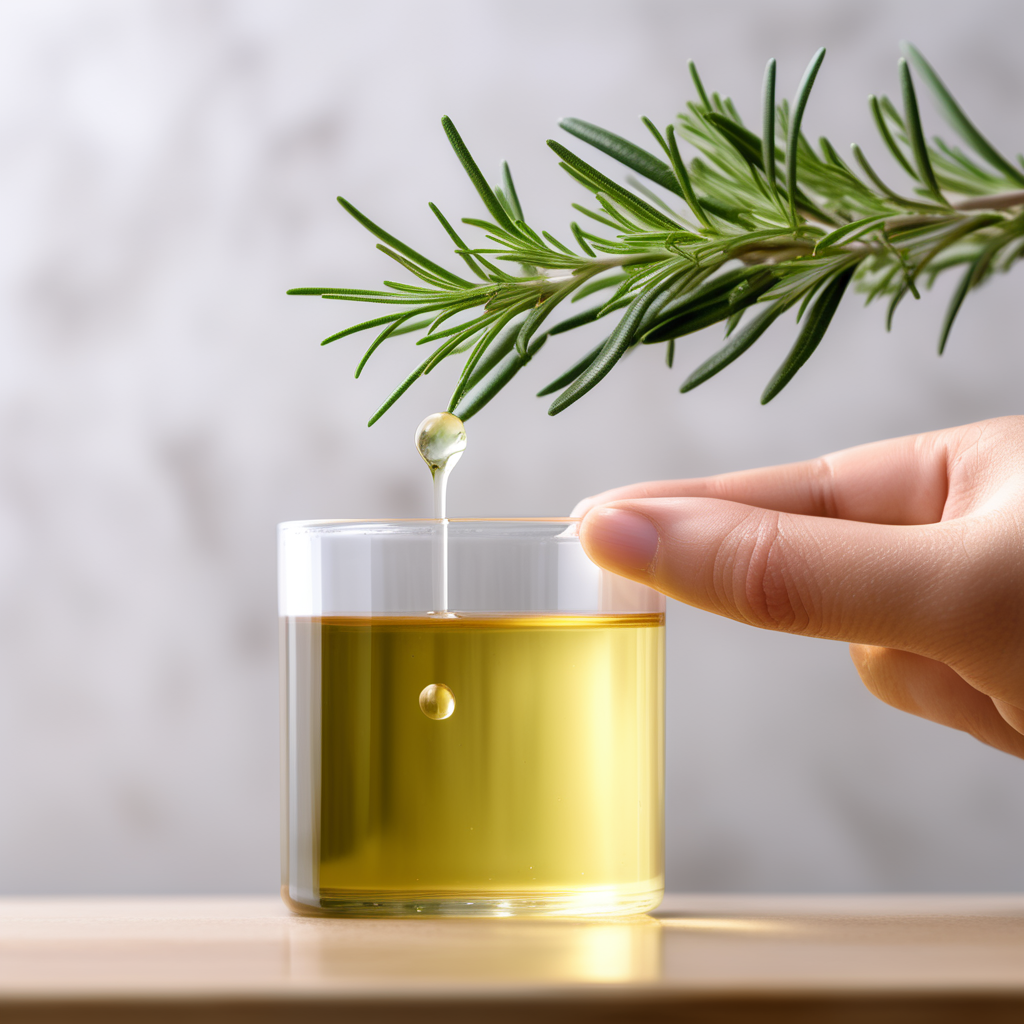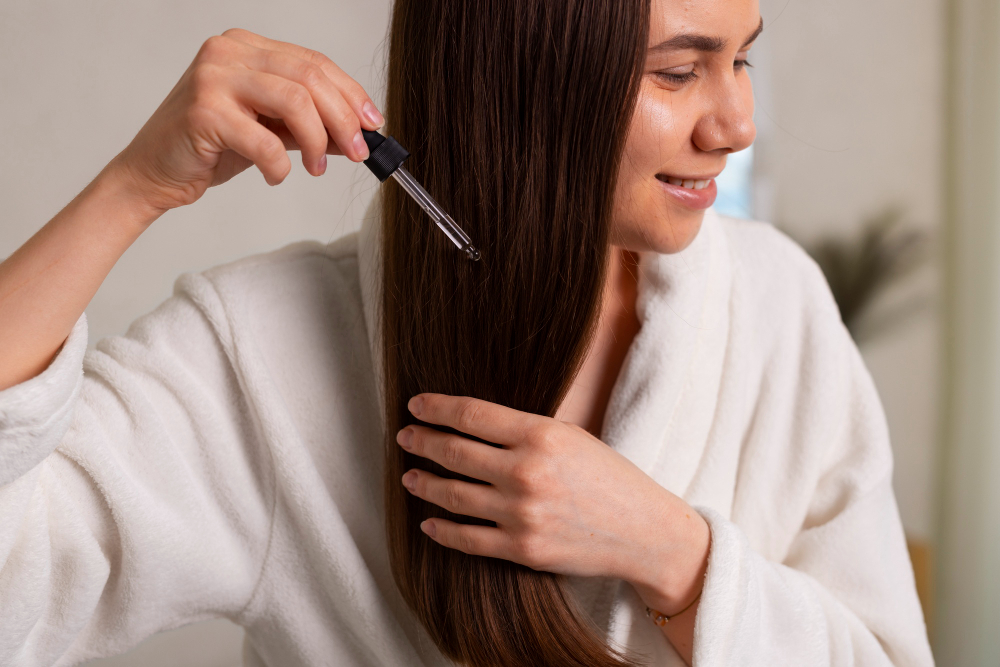If you are looking to make rosemary oil for hair, your search will end here. Because in this article, you will get to know how to make rosemary oil for hair. After reading this article, you can try DIY rosemary oil for hair and can make rosemary oil by following the rosemary oil recipe mentioned here.
Many people have a common desire to have healthy, lustrous hair. While there are countless hair care products available in the market, the use of natural oils has gained popularity due to their ability to promote hair growth and enhance hair quality. One such oil that has been celebrated for its hair benefits is rosemary oil. In this article, we will delve into the secrets of luxurious hair and learn how to make rosemary oil for hair at home.
Rosemary Oil Benefits for Hair
Rosemary oil is a popular choice for hair growth due to its numerous benefits. It contains antioxidants that help combat free radicals, which can damage hair follicles and impede growth. Additionally, rosemary oil improves blood circulation in the scalp, ensuring that the hair follicles receive an adequate supply of nutrients and oxygen. This stimulus stops hair loss and encourages hair growth. Furthermore, rosemary oil has antimicrobial properties that help keep the scalp clean and free from any microbial infections, promoting a healthy environment for hair growth. To gain all these benefits you need to learn how to make rosemary oil for hair.
Understanding the Properties of Rosemary Oil
What is Rosemary Oil good for
Before learning how to make rosemary oil for hair, it is good to fully comprehend the power of rosemary oil for hair growth. So it is essential to understand its properties. Rosemary oil contains a range of beneficial compounds such as rosmarinic acid, caffeic acid, and ursolic acid.
These compounds have anti-inflammatory properties that soothe the scalp and reduce any inflammation, which can hinder hair growth. Additionally, rosemary oil is rich in vitamins and minerals, including vitamin C, calcium, and iron, which nourish the hair follicles and promote healthy hair growth. Its pleasant aroma also provides a soothing and relaxing experience during hair care routines. That’s why you need to learn how to make rosemary oil for hair.
What Sets Rosemary Oil Apart
Rosemary oil, derived from the Rosmarinus officinalis plant, is renowned for its rich history and multifaceted uses. Packed with antioxidants, it promotes hair growth, combats skin issues, and invigorates the senses. The key lies in the extraction process, ensuring the preservation of its natural goodness. So to gain all these properties, it is needed to learn how to make rosemary oil for hair.
Step-by-step guide: How to Make Rosemary Oil for Hair
DIY Rosemary Oil for Hair
Making rosemary oil for hair at home is a simple and cost-effective way to harness rosemary oil benefits for hair. Here is a step-by-step guide for how to make rosemary oil for hair. This rosemary oil recipe will help you create organic rosemary oil at home.
Materials Needed
Gather the following ingredients before starting this aromatic journey:
- Fresh rosemary leaves
- Carrier oil (olive oil or jojoba oil or coconut oil)
- Glass jar with a tight lid
- Strainer or cheesecloth
- Dark glass bottle for storage
Step-by-Step Process: Homemade Rosemary Oil for Hair
- Prepare the rosemary: Wash the rosemary leaves thoroughly to remove any dirt or impurities. Using a fresh towel, pat them dry to make sure there is no remaining wetness.
- Infuse the oil: Place the rosemary leaves in the glass jar and pour the carrier oil over them until they are fully submerged. Close the jar tightly to prevent any air from entering.
- Steep the mixture: Store the jar in a cool and dark place for at least two weeks, allowing the rosemary leaves to infuse their properties into the oil. To speed up the infusion process, gently shake the jar every few days.
- Strain the oil: After two weeks, strain the oil using a strainer or cheesecloth to remove the rosemary leaves. Transfer the infused oil into a clean bottle or container, ensuring it is tightly sealed.
- Store and use: Keep the rosemary oil in a cool and dark place to maintain its potency. It is now ready for use in your hair care routine.
Different Methods of Extracting Rosemary Oil
Now you know how to make rosemary oil for hair. While the infusion method is commonly used to extract rosemary oil, there are alternative methods depending on your preference and availability of ingredients. You can try the following few approaches:
- Steam distillation: This is a more advanced method that requires a distillation apparatus. It involves heating the rosemary leaves and collecting the condensation, which contains the essential oil.
- Cold-press extraction: This method involves pressing the rosemary leaves to extract the oil. It requires a mechanical press and is commonly used for larger-scale oil production.
Regardless of the method you choose, it is important to ensure the quality and freshness of the rosemary leaves to yield the best results.
How to Dilute Rosemary Oil for Hair
While rosemary oil is highly beneficial for hair growth, it is important to dilute it properly before use. By using the above rosemary oil recipe for how to make rosemary oil for hair, you will get pure rosemary oil. As it is an essential oil, direct application can be too potent and may cause skin irritation. Here is a simple guide to diluting rosemary oil for safe and effective use:
- Choose a carrier oil: Select a carrier oil such as olive oil, coconut oil, or almond oil. These oils help dilute the rosemary oil while providing additional nourishment to the hair.
- Mix the oils: In a small bowl or bottle, combine a few drops of rosemary oil with a tablespoon of the chosen carrier oil. Depending on the sensitivity and type of your hair, change the ratio.
- Blend thoroughly: Stir or shake the mixture well until the oils are fully blended. Now the diluted rosemary oil for hair is ready to apply on hair.
How to Apply Rosemary Oil to Scalp
So far we have prepared pure rosemary oil by following the rosemary oil recipe for how to make rosemary oil for hair. Then we further prepared diluted rosemary oil for hair. Now let’s see how to apply rosemary oil to scalp. Applying rosemary oil to the scalp can be beneficial for promoting hair health, hair growth and addressing issues like dandruff or hair loss. Here’s a simple guide on how to apply rosemary oil to scalp:
- Perform a patch test: Before applying the diluted rosemary oil for hair, perform a patch test on a small area of your skin. This will help ensure that you do not have any adverse reactions to the mixture.
- Section Your Hair: If you have long or thick hair, it may be helpful to section your hair for easier application.
- Apply the Mixture: Use an applicator bottle or dropper to apply the oil mixture directly to your scalp. Part your hair and apply the mixture evenly, focusing on the roots and areas where you want to address issues like dandruff or hair thinning.
- Massage Your Scalp: Gently rub your scalp with your fingertips. This helps improve blood circulation and ensures that the oil is distributed evenly.
- Comb Through (Optional): If you prefer, you can use a comb or brush to distribute the oil further and detangle your hair.
- Leave it On: Depending on your preference, you can leave the oil on for 30 minutes to few hours or overnight. Some people prefer leaving it on overnight for a deep treatment. If you plan to leave it overnight, consider wearing a shower cap to protect your pillow.
- Shampoo and Rinse: Use a mild shampoo to wash your hair and get rid of any remaining oil after the suggested amount of time. You may need to shampoo twice in order to ensure that all of the oil is gone.
- Repeat: For best results, repeat this process regularly, such as once or twice a week.
Remember to do a patch test before applying any essential oil to ensure you don’t have an allergic reaction. If you experience any irritation, discontinue use. Additionally, consult with a healthcare professional if you have any specific concerns about your scalp or hair health. Following these guidelines will help you harness the rosemary oil benefits for hair while ensuring the safety of your hair and scalp. Now this solves your questions how to make rosemary oil for hair, how to dilute rosemary oil for hair and how to apply rosemary oil to scalp.
Instructions to use rosemary oil for hair growth
Now as you know how to make rosemary oil for hair, we will look into some tips. To maximize the rosemary oil benefits for hair, here are some additional tips to consider:
- Consistency is key: Incorporate rosemary oil into your hair care routine consistently for optimal results. Regular use will allow the oil to nourish and strengthen your hair over time.
- Massage the scalp: When applying rosemary oil, take the time to massage your scalp gently. This stimulates blood circulation and enhances the absorption of the oil into the hair follicles.
- Protect your hair: Use rosemary oil as a protective treatment by applying it to your hair before exposure to chlorine, sun, or harsh weather conditions. This helps create a barrier and prevent damage to your hair.
- Stay hydrated: Hydration plays a crucial role in promoting hair growth. Ensure you drink enough water and maintain a balanced diet to support the effectiveness of rosemary oil.
Other essential oils that can be combined with rosemary oil for maximum benefits
By making rosemary oil for hair, you solved the main question how to make rosemary oil for hair. While rosemary oil is highly potent on its own, combining it with other essential oils can further enhance rosemary oil benefits for hair. Here are a few essential oils that can be combined with rosemary oil:
- Lavender oil: Lavender oil has soothing properties that complement the stimulating effects of rosemary oil. It also aids in promoting relaxation and a restful sleep.
- Peppermint oil: Peppermint oil provides a cooling sensation that invigorates the scalp and promotes hair growth. When combined with rosemary oil, it creates a powerful blend for improved hair health.
- Cedarwood oil: Cedarwood oil is known for its ability to balance oil production in the scalp, making it an ideal companion for rosemary oil. It smells nice and woodsy.
Experiment with different combinations to find the blend that suits your hair and scalp needs best.
DIY hair care recipes using rosemary oil
You gained knowledge about how to make rosemary oil for hair. In addition to using rosemary oil on its own, you can incorporate it into homemade hair care recipe. To get you started, think about the following ideas:
- Rosemary Oil Hair Mask:
- Ingredients: 2 tablespoons of rosemary oil, 1 ripe avocado, 1 tablespoon of honey.
- Instructions: Mash the avocado until smooth, then mix in the rosemary oil and honey. Focusing on the roots and ends of the damp hair, apply the mask. After leaving it on for 20 minutes, give it a good rinse.
- Rosemary Oil Scalp Scrub:
- Ingredients: 2 tablespoons of rosemary oil, 1 cup of brown sugar, 1 tablespoon of coconut oil.
- Instructions: Mix all the ingredients thoroughly. Gently massage the scrub onto your scalp in circular motions for a few minutes, then rinse thoroughly.
- Rosemary Oil Leave-In Conditioner:
- Ingredients: 1 cup of water, 1 tablespoon of rosemary oil, 1 tablespoon of aloe vera gel.
- Instructions: Mix the water, rosemary oil, and aloe vera gel in a spray bottle. Shake well before each use and spritz onto damp hair after showering.
Feel free to experiment with these recipes and adjust the quantities based on your hair length and thickness.
Where to buy high-quality rosemary oil
If you prefer to purchase rosemary oil instead of making rosemary oil at home, it is important to ensure its quality. Look for reputable brands that offer pure organic rosemary oil for hair. Health food stores, online retailers, and specialty beauty stores often carry high-quality rosemary oil. Read rosemary oil reviews, customer reviews and check for certifications to ensure you are purchasing a genuine product. Some best rosemary oil brands are mentioned here. You can check respective rosemary oil reviews by clicking link followed by product.
3 Best Rosemary Oil for Hair Growth
- Nature Spell Rosemary Oil:
- Positive User Feedback: The combination of pure and natural oils works wonders for both hair and body. It’s a relief to find a product with no mineral oil or parabens. Plus, the fact that it’s a British brand, made in England, adds an extra layer of trust and quality assurance.
- Maple Holistics 100% Pure Rosemary Oil for Hair Growth:
- Positive User Feedback: This 100% pure and organic Rosemary Oil is a game-changer! It’s a powerhouse for hair care, nourishing the scalp and promoting growth effectively.
- INFINA ESSENTIALS Rosemary Scalp & Hair Oil:
- Positive User Feedback: Infina Essentials Rosemary Hair Oil is a powerhouse for hair and scalp care. It’s a boon for dry, damaged hair, fortifying strands and promoting healthier, resilient locks.
Conclusion: How to Make Rosemary Oil for Hair
In conclusion, the secrets to unlocking luxurious hair lie within the power of rosemary oil. By understanding its properties and learning how to make rosemary oil for hair, you can harness the rosemary oil benefits for hair and overall hair health. Remember to dilute the oil properly, experiment with other essential oil combinations, and incorporate it into your hair care routine consistently. Whether you choose to make rosemary oil yourself or purchase it from a trusted source, embracing this natural remedy will lead you on the path to luxurious and healthy hair. Adopting a balanced diet and practicing good hair care habits are essential for promoting a Healthy Life, which translates to having vibrant and resilient hair.
FAQs: How to Make Rosemary Oil for Hair
- How long does it take to see results from using rosemary oil for hair?
- Results vary, but consistent use can lead to noticeable improvements within a few weeks.
- Can I use dried rosemary instead of fresh for making rosemary oil?
- While fresh is preferred, dried rosemary can be used, but fresh provides more potent results.
- Is rosemary oil suitable for all hair types?
- Yes, rosemary oil is generally suitable for all hair types, but a patch test is recommended for sensitive individuals.
- How long to leave rosemary oil in hair?
- It’s advisable to leave it on for a minimum of 30 minutes, but overnight application is safe for those seeking deeper nourishment.
- Are there any side effects of using rosemary oil for hair?
- It’s rare, although some people might get a little irritated. Patch tests should always be carried out before broad usage.
- How to make rosemary oil with coconut oil?
- You can easily make it by following the rosemary oil recipe for how to make rosemary oil for hair mentioned in this article. Just use coconut oil as a carrier oil.
